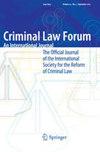The Catalysing Effect of the Rome Statute in Africa: Positive Complementarity and Self-Referrals
IF 0.8
Q3 CRIMINOLOGY & PENOLOGY
引用次数: 2
Abstract
The International Criminal Court’s (ICC) policy and practice of self-referrals has attracted some degree of academic criticism. This has been due partly because the procedure itself was, according to some opinions, never quite envisaged in the original Rome Statute, and partly because the concept of a State self-referral appears to contradict the Rome Statute objective of the ICC as a Court of complementarity. Following Gabon’s self-referral in 2016, and in view of the recent termination of the ICC Prosecutor’s Preliminary Examinations in Gabon, this paper argues that African States’ self-referral practice continues to represent a step backwards for African local justice and accountability. The fact that in this particular situation the necessary threshold was not met is actually not relevant for the argument put forward in this paper, namely that this practice should now be put under scrutiny rather than accepting, at face value, a self-referral whenever an (African) State proposes it. The strengthening of local accountability and the transformation of the local justice landscape should be considered as the ICC long-term objectives, and more dialogue (as well as political pressure) should be contemplated in order to gently coerce States to take on investigations and prosecutions of international crimes.《罗马规约》在非洲的催化作用:积极互补和自我参照
国际刑事法院(ICC)的自我移交政策和实践引起了一定程度的学术批评。造成这种情况的部分原因是,根据一些意见,最初的《罗马规约》从未完全设想过程序本身,部分原因是,国家自行提交的概念似乎与《罗马规约》关于国际刑事法院作为一个互补法院的目标相抵触。继2016年加蓬的自我移交之后,鉴于最近国际刑事法院在加蓬的检察官初步审查被终止,本文认为,非洲国家的自我移交做法继续代表着非洲地方司法和问责制的倒退。在这种特殊情况下,没有达到必要的门槛这一事实实际上与本文件提出的论点无关,即现在应该审查这一做法,而不是在表面上接受(非洲)国家提出的自我移交。应将加强地方问责制和改变地方司法格局视为国际刑事法院的长期目标,并应考虑进行更多的对话(以及施加政治压力),以便温和地迫使各国对国际罪行进行调查和起诉。
本文章由计算机程序翻译,如有差异,请以英文原文为准。
求助全文
约1分钟内获得全文
求助全文
来源期刊

Criminal Law Forum
Multiple-
CiteScore
1.00
自引率
0.00%
发文量
17
期刊介绍:
Criminal Law Forum is a peer-review journal dedicated to the advancement of criminal law theory, practice, and reform throughout the world. Under the direction of an international editorial board, Criminal Law Forum serves the global community of criminal law scholars and practitioners through the publication of original contributions and the dissemination of noteworthy public documents. Criminal Law Forum is published pursuant to an agreement with the Society for the Reform of Criminal Law, based in Vancouver, British Columbia.
 求助内容:
求助内容: 应助结果提醒方式:
应助结果提醒方式:


